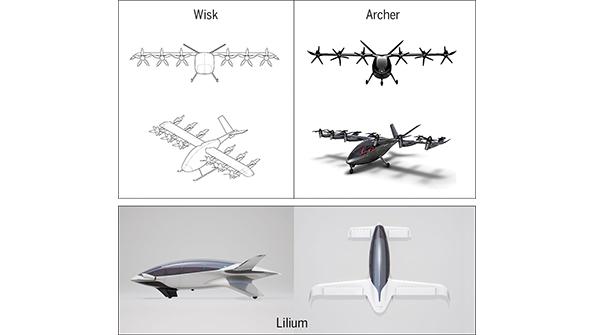Competition Heats Up In UAM Market | UAMマーケットにおける競争が過熱

黎明期といえる次世代エアモビリティ業界において100社以上がしのぎを削り合う中、遅かれ早かれこの競争はさらに過熱していくことになるだろう。
スタートアップ各社は商業運航第1号の座を巡り、まさにお互い最初のパンチを放ったところだ。
電動垂直離着陸(eVTOL)機の開発を進めるスタートアップ企業が、特別目的買収会社(Special Purpose Acquisition Company:SPAC)との合併を通じて何十億ドルもの資金を調達するようになったことで、この殴り合いが始まった。このトレンドにより、都市型エアモビリティ(UAM)競争の主導権は今年だけでもすでに数回入れ替わっている。
ラウンド1:2月に中国のEHang社は、架空取引による売上偽装や、生産および認証の進捗状況を誇張しているとして、空売りを仕掛けているWolfpack Research社から非難を受けた。また、同社はeVTOL機の設計の品質と安全についても疑問を呈している。これに対しEHang社は、広報活動および訴訟により対抗している。
EHang社はeVTOL機開発の主要企業としては第1号となる2019年12月に上場を果たしており、これらの問題の一部は上場を目指す過程の中で生じたものと考えられる。同社はその後、投資家に対する透明性をより高めていったが、Wolfpack社の指摘の一部は、法規制がEHang社にとって有利といえる中国を越えて、自律型eVTOL機事業を国外に拡大できるのかという業界の懸念とも一致している。
ラウンド2: Volocopter社は2011年にシンプルな試作機を飛行させたことで、eVTOL機のパイオニアと呼ぶことができるだろう。また同社は、UAMの商業運航を最初期に開始するとも考えられており、2023年の運航開始を予定している。しかし今では、より目立つ新興企業がSPACにより数十億ドルの資金調達を成功させる様を目の当たりにしている。
そのためか、同社は新たなホワイトペーパーを発表し、「電動都市型エアモビリティのパイオニア」という新たなブランディングを行っている。同社のVoloCity eVTOLマルチコプターは性能が限定的(パイロットおよび乗客1名を乗せ、90km/hで航続距離35km)だが、シンプルで静粛性が高く、2035年には世界中の都市で10万機が運航されるほどにスケールできると主張している。
ラウンド3:3月にSPACと33億ドル規模の合併を発表したLilium社も、同社が主張する性能に対する懐疑的な見方を覆すための反撃を開始した。他社が2〜4人乗りの都市内移動用の eVTOL式UAMの開発を進める中、同社は7人乗りで250〜280km/hを発揮する、都市間移動用のダクテッドファン式UAMを開発している。
ホバリング時における効率については、ダクテッドファンよりも電動ローターの方が優れていることは同社も認めているが、短時間の垂直離着陸時に必要な高出力と、遠距離の高速巡航に必要な容量を持つバッテリーの試験も進んでおり、2024年末には商業運航が可能になると同社は主張している。
ラウンド4:Kitty Hawk社とボーイング社の合弁企業であるWisk社は、ライバル企業が同社の次世代eVTOL機の設計を盗んだとして訴訟を起こした。同社では2人乗り自律飛行機であるCoraの飛行試験を進める一方、FAA認証の取得を目的とした第6世代機の設計を進めている。
この設計に関する2020年の機密特許出願は、Wisk社からArcher社に引き抜かれたエンジニアが盗んだデータのひとつとされている。Wisk社は、Archer社が創業からわずか3年でSPACによる38億ドルの資金調達に至った経緯に疑念を抱いているが、Archer社は不正行為を否定している。
ラウンド5:初期のUAM開発競争におけるダークホース・Beta Technologies社は、SPACによる資金調達の盛り上がりに対して、同社のAlia eVTOL機に対する大量受注の発表で応えた。この中には、UPSの子会社である UPS Flight Forward社が貨物フィーダー機として使用する10機(最大150機)や、 Blade Urban Air Mobility社がオンデマンド式の旅客サービスで使用する最大20機が含まれている。
Beta社はこれまでのところ、最初の顧客であり、移植用臓器の輸送を想定しているUnited Therapeutics社からの資金提供を中心に、控えめな活動を続けてきた。BetaはまだSPACとの契約には至っていないが、まだまだ発注の絶対数が少ないUAM業界においては、主導的な立場にいると同社は主張している。
Aviation Week Intelligence Network (AWIN) のメンバーシップにご登録いただくと、開発プログラムやフリートの情報、会社や連絡先データベースへのアクセスが可能になり、新たなビジネスの発見やマーケット動向を把握することができます。貴社向けにカスタマイズされた製品デモをリクエスト。
With more than 100 companies vying to enter the nascent advanced air mobility industry, the competition was always going to get bloody sooner or later.
Now the first blows have been exchanged as startups elbow to be first to market.
Fists have started flying as electric vertical-takeoff-and-landing (eVTOL) startups attract billions of dollars of investment via mergers with special purpose acquisition companies (SPAC). This trend has resulted in leadership of the urban air mobility (UAM) race changing hands several times already this year.
Round 1: In February, China’s EHang was savaged by short-seller Wolfpack Research, which accused it of fabricating revenues from sham sales and overstating its production and certification progress. Wolfpack also questioned the quality and safety of its eVTOL design. EHang fired back with a PR blitz and a lawsuit.
EHang was the first of the eVTOL leaders to be publicly listed, in December 2019, and some of its issues can be attributed to learning to be a public company. The startup has moved to be more transparent with investors, but some of Wolkpack’s criticisms echo with industry concerns about whether EHang can expand its autonomous eVTOL business beyond the supportive regulatory regime in China.
Round 2: Volocopter can rightly claim to be a pioneer in eVTOL, having flown its first, simple prototype in 2011. And the German startup expects to be one of the first to begin commercial UAM service, in 2023. But it has seen newer, glitzier entrants race ahead to raise billions in SPAC funding.
Perhaps because of this, Volocopter has released a white paper and new branding emphasizing its claim to be “the “pioneer of electric urban air mobility.” While its VoloCity multicopter eVTOL is limited in capability and capacity, carrying a pilot and one passenger 35 km at 90 kph (22 mi. at 56 mph), the startup argues it is simple, quiet and can scale to 100,000 air taxis operating in cities globally by 2035.
Round 3: Announcing a $3.3 billion SPAC merger in March, Lilium also launched an offensive to counter skepticism over its performance claims. While competitors are developing two- or four-passenger eVTOLs with exposed rotors and targeting intra-city UAM, the German startup is developing a seven-seat ducted-fan vehicle aimed at inter-city regional air mobility and designed to fly up to 250 km and 280 kph.
Lilium acknowledges ducted electric vectored thrust is less efficient than rotors in the hover, but says it is already testing batteries that will provide the high power required for the brief vertical takeoff and landing phases and the energy needed for fast regional transport. And they will be commercially available for the launch of passenger flight by the end of 2024, the startup says.
Round 4: Wisk, the joint venture between Kitty Hawk and Boeing, has filed a lawsuit accusing a rival UAM startup of stealing the design of its next-generation eVTOL. Wisk is flight-testing its two-seat, self-piloted Cora but now developing a sixth-generation design for eventual FAA certification.
The confidential 2020 patent application for this design is among data that engineers hired away from Wisk by Archer are accused of stealing when they left. Wisk questions the rival startup’s ability to move from founding to a $3.8 billion SPAC in barely three years, but Archer denies any wrongdoing.
Round 5: The dark horse among early leaders in the UAM race, Beta Technologies, has responded to the SPAC frenzy by announcing significant orders for its Alia eVTOL. These include an initial 10 of up to 150 for UPS subsidiary UPS Flight Forward for use as feeder freighters, and up to 20 for use on Blade Urban Air Mobility’s on-demand passenger service.
Beta has stayed low key so far, largely privately funded by its first customer, United Therapeutics, which plans to use the Alia to transport organs for human transplantation. Beta has yet to follow the field and strike a SPAC deal, but with orders a scarce commodity in the UAM world the startup is clearly staking its claim to be an earlier leader in the market.

